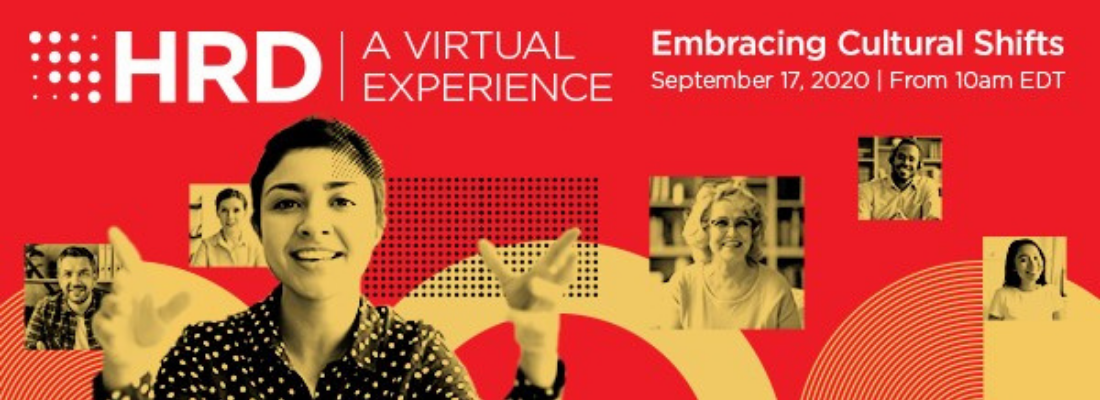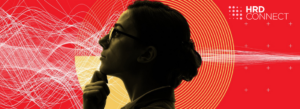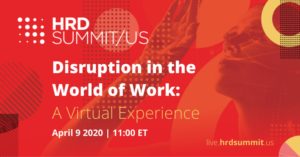HRD: A Virtual Experience US - event summary - Twitter, Google, McDonald's, and more
- 8 Min Read
On September 17th 2020, we broke new ground with HRD: A Virtual Experience – Embracing Cultural Shifts. Hand-tailored for our US audience, this 100% online event boasted more than 3,000 registered delegates, 25 speakers, and five interactive work streams. For those who couldn’t make it, here are our highlights from the day.
- Author: HRD Connect
- Date published: Sep 29, 2020
- Categories

With the world having reached a standstill, HRD first turned its attention to virtual events in April earlier this year. Our debut virtual experience brought great value to our audience and garnered outstanding feedback, and so just two months later, we delivered our sophomore effort with aplomb.
Having featured a catalog of majorly influential brands and served thousands of delegates across the two events, we set about devising our most accomplished installment yet, and prepared to deliver it to our US audience on September 17th.
On this occasion, we took the opportunity to address a simply unavoidable issue in the business world of 2020: cultural shifts. With another star-studded lineup of 25 speakers across five, 100% online, interactive work streams, our audience were offered a unique opportunity to create an agile vision for the future and reshape the way their organizations do business.
If you were unable to attend on the day or simply need a recap, here are some highlights and top takeaways from the day’s program.
Keynote: Redefining the Constructs that Bind Work and Life – Jennifer Christie, CHRO, Twitter
As far as opening keynotes go, few could have brought greater and more authentic insight than Jennifer Christie. Twitter is an organization that has led by example during the pandemic, refusing to flinch, and declaring back in May that its employees would be allowed to work from home ‘forever’.
This in itself is a seismic cultural shift and Christie went on to provide commentary on this, questioning how an organization can define its culture in a remote environment.
In doing so, she explained why Twitter was ahead of the curve in this respect, alluding to a workforce strategy initiative that the organization launched in 2018, known as ‘global blueprint’. This was aimed at redefining how and where employees worked, taking a much more liberal approach to this.
“We knew it would be worth it, because not only would it help us retain employees who wanted more optionality about where they lived and how they worked, but it would enable us to hire all the best people no matter where they were, and be able to tap into broader, more diverse talent pools,” she said.
She acknowledged that this was a multi-faceted process, and went on to outline some of the core components. Most notably, these included fostering a culture of flexibility, decentralizing the organization, and ensuring that manager capabilities were of a standard that suited these new ways of working and ensured employees received adequate guidance and support.
“It allowed us to really test and learn different ways of working that we were then able to build into our strategy,” she said.
Christie concluded by stressing that introducing a certain work style is one thing, but ensuring that the employee has a positive experience is another.
She said: “If we can double down on that remote experience and ensure that, no matter what the workstyle is, it’s a shared experience, that will be the difference for companies.
“Now is our moment – we have to lean into it.”
Panel discussion: Developing Crisis Plans for Today’s Business Landscape – Google, McDonald’s Corporation & Pymetrics
While raw insight and expertise can often provide great value, the benefit of organic, free-flowing conversation is not to be underestimated. Here, our aim was to provide exactly that.
With Lauri Ruettimann of Punk Rock HR providing engaging moderation, this session boasted a collision of three great HR minds: Jez Langhorn,VP, Centre HR, McDonald’s Corporation; Frida Polli, CEO, Pymetrics; and Claudy Jules, Centre of Expertise for Organizational Health & Change, Google.
At the core of this discussion was the topic of crisis management within an organization, what this looks like, and how it can have an impact, and the trio were able to draw from a range of experiences in contributing to the discussion.
Langhorn began by invoking the phrase, ‘don’t let a good crisis go to waste’, explaining that now is the time for organizations to make fundamental changes to prepare themselves for the future.
Most notably, Langhorn spoke of implementing a “people-first approach”, and the concept of future-proofing the organization. For instance, he gave details of McDonald’s Corporation’s newly formed partnership with Mayo Clinic, allowing the organization access to the most up-to-date and highest quality medical insight. This, Langhorn explained, is a measure that will remain post-pandemic.
Jules offered his thoughts from a slightly different angle, speaking of the inequality that exists in organizations.
“COVID has revealed that there are lots of inequities and inequalities, structurally, whether it’s financial, whether it’s social, or even sustainable, in terms of climate change,” he said.
“You no longer can separate organizational design, strategy, diversity, equity and inclusion, and sustainability, and treat them as distinct disciplines or specialized units. They really do require more integration.”
Polli supplemented this dialogue around D&I and company values, by suggesting that COVID-19 has presented an opportunity for organizations to correct defective thought patterns and bad habits, and undergo somewhat of a reset.
In explaining this, she referred to what’s known as ‘System One’ and ‘System Two’ thinking: the former being subconscious, rapid, evolutionary reactions, and the latter being much more conscious, slow, and methodical.
Overall, she argued that we haven’t yet found a solution to ‘System One’ thinking, and that this reflects heavily in the business world.
“What we need to do is co-opt our System Two thinking to design processes in HR to basically put the breaks on System One thinking,” she concluded.
Masterclass: Transforming the way you work – Paul Hevesy, VP Organizational Effectiveness, Stanley Black & Decker
With a theme of redefining the workplace now firmly established, Stanley Black & Decker’s Paul Hevesy took to the stage to continue the dialogue; but in a slightly different way.
While much of the event’s conversations concerned fundamental, seismic change, Hevesy used his time to discuss change on a smaller scale, and how significant transformation can be achieved by taking a series of small steps.
He primarily spoke of how minor adjustments in the working day can save time for everyone involved, and that these measures will accumulate, and ultimately increase productivity across the organization.
He referred to this as “Work transformation”, and explained that this centers around “the basics of day-to-day working, and enhancing those”.
He posited that an organization’s general communication strategy has a big part to play in achieving this. For instance, he pointed out that, often, excessively long emails are used to convey simple pieces of information. Similarly, he noted that many employees are required for weekly, recurring meetings that don’t necessary concern them, and during which they rarely contribute.
Concluding, Hevesy offered some simple advice to attendees. He recommended that if they host meetings throughout the week, they should reduce the length of them by 15 minutes and make sure that an agenda is added. Likewise, he said that if you join several recurring meetings throughout the week as an attendee, you should step back and look at the ones where you only say ‘hi’ and the beginning and ‘bye’ at the end, and make it known that you think your time could be better spent if you were not required to attend.
“Those are two practical things that you can do today, that will start you on that journey,” he said.
Keynote: People first, the Crucial Integration of HR and Business Strategy: Jeanne Meister, Managing Partner, Future Workplace
In delivering the event’s second keynote of the day, Jeanne Meister, Managing Partner, Future Workplace, reverted to a higher, more fundamental level of HR influence.
She discussed the role of HR in 2020, positing that now, it is more crucial than ever, and represents a core component of business strategy. More specifically, she placed this into the context of health and safety, and how the HR function is more responsible for this than ever before.
She also notes the considerable influence of technology (and AI in particular) in achieving this, noting that 32% of organizations are deploying virtual reality (VR) for corporate training, and another 37% are set to pilot VR for training by 2022 (Gartner, 2019).
Meister concluded her session by offering three key takeaways regarding what she calls “the alignment of HR and strategy”.
First, she noted that “your job is not your job”, explaining that “it’s not necessarily the job per se, it’s what you are hoping to accomplish for your company”.
Secondly, she encouraged attendees to “identify new HR jobs in your company to meet new priorities”. She went on to explain that in many cases, the formula for HR job titles and definitions is outdated, and asserted that organizations must rethink these titles in accordance with the changing climate.
Finally, Meister states that organizations should “look for ways that technology can build a more human experience at work”.
“It’s up to us to put the human back into human resources,” she said.



